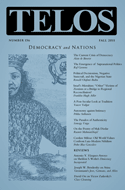Pedro Blas González’s “Czesław Miłosz: Old-World Values Confront Late-Modern Nihilism” appears in Telos 156 (Fall 2011). Read the full version online at the TELOS Online website, or purchase a print copy of the issue here.
 Czesław Miłosz’s The Captive Mind is unrivalled by other theoretical and abstract treatises in its sheer ability to grasp the criminal essence of political reality under communism. The Captive Mind, which was published in 1953 by the 1980 recipient of the Noble Prize in literature, chronicles and dissects the mind and soul of Marxist intellectuals and their readiness to embrace communism. Focusing his attention on the life-trajectory of real writers and thinkers who were acquaintances of Milosz’s, the Polish writer is able to pinpoint the many rewards that communism offers the intellectuals who embrace it. In this and other respects, Miłosz keeps some very distinguished company, with writers like Aleksandr Solzhenitsyn, Karl Popper, Leszek Kołakowski, Arthur Koestler, Jean-Francois Revel, and Paul Hollander, some who lived under communism. These writers have enlightened western democracies about the structure of realpolitiks and dialectical materialism, and the necessary outcome of what some naïvely like to call “praxis.” Miłosz’s formation as a writer and thinker took place during the 1930s, a time that saw Europe in the grasp of the two dominant totalitarian ideologies of the twentieth century: fascism and communism. This historical context was to form the backbone of The Captive Mind. From a historical and humanistic perspective, this context remains very important today, for it gives us an opportunity to revisit the essential human qualities and virtues that have to be subsumed by totalitarianism in order for such governments to rule with an iron fist.
Czesław Miłosz’s The Captive Mind is unrivalled by other theoretical and abstract treatises in its sheer ability to grasp the criminal essence of political reality under communism. The Captive Mind, which was published in 1953 by the 1980 recipient of the Noble Prize in literature, chronicles and dissects the mind and soul of Marxist intellectuals and their readiness to embrace communism. Focusing his attention on the life-trajectory of real writers and thinkers who were acquaintances of Milosz’s, the Polish writer is able to pinpoint the many rewards that communism offers the intellectuals who embrace it. In this and other respects, Miłosz keeps some very distinguished company, with writers like Aleksandr Solzhenitsyn, Karl Popper, Leszek Kołakowski, Arthur Koestler, Jean-Francois Revel, and Paul Hollander, some who lived under communism. These writers have enlightened western democracies about the structure of realpolitiks and dialectical materialism, and the necessary outcome of what some naïvely like to call “praxis.” Miłosz’s formation as a writer and thinker took place during the 1930s, a time that saw Europe in the grasp of the two dominant totalitarian ideologies of the twentieth century: fascism and communism. This historical context was to form the backbone of The Captive Mind. From a historical and humanistic perspective, this context remains very important today, for it gives us an opportunity to revisit the essential human qualities and virtues that have to be subsumed by totalitarianism in order for such governments to rule with an iron fist.



